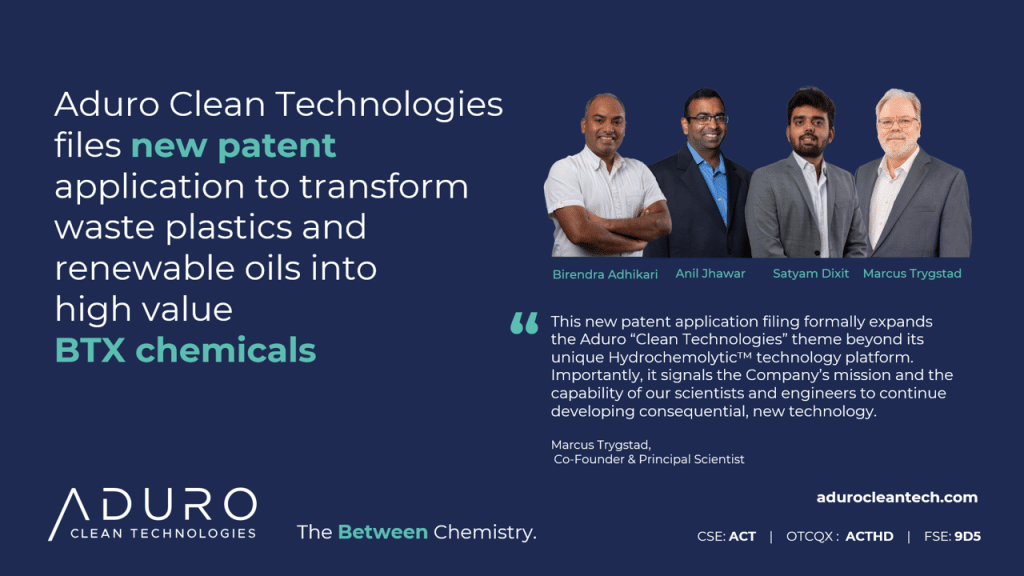Aduro Clean Technologies Inc., a leading clean technology company, has announced a groundbreaking development in its quest to revolutionise the production of high-value chemicals from renewable resources and waste plastics. The company has filed a new patent for an innovative technology that transforms these lower-value feedstocks into essential platform chemicals, marking a significant milestone in its technological advancement.
The patent application introduces a novel method for producing alkyl aromatic compounds, such as benzene, toluene, xylenes (BTX), and ethylbenzene, from waste plastics and renewable oils. This new process is not only more efficient and cost-effective than traditional BTX production methods, which typically rely on refined petroleum, but it also builds upon Aduro’s existing technologies. The method integrates advancements from Aduro’s patented thermocatalytic deoxygenation (TCD) technology, used for upgrading renewable oils, and insights from its Hydrochemolytic™ Technology (HCT) for the chemical recycling of waste plastics.
BTX compounds are fundamental to the production of a wide range of high-value chemicals and materials, including plastics, paints, sealants, coatings, and pharmaceuticals. They account for approximately 40% of petrochemical production by volume. With the global BTX market projected to reach US$274.78 billion by 2027, there is a growing demand for innovative and sustainable production methods. Aduro’s new technology offers a promising solution to this challenge by enabling the production of BTX from non-petroleum sources, thus promoting circularity and reducing dependence on fossil fuels.
Ofer Vicus, CEO of Aduro, highlighted the significance of the new patent application in advancing the company’s technology and intellectual property portfolio. “The new patent application marks significant progress towards a key objective set out by Aduro at the beginning of the year,” Vicus said. “It underscores our scientists’ ability and commitment to pursuing value through innovative solutions, enabling us to explore new potential market opportunities. This achievement also highlights our dedication to developing and commercialising sustainable technologies aimed at addressing global environmental and circularity concerns.”
Marcus Trygstad, Co-Founder and Principal Scientist at Aduro, further emphasised the importance of this development. “This new patent application filing formally expands the Aduro ‘Clean Technologies’ theme beyond its unique Hydrochemolytic™ technology platform. It signals the Company’s mission and the capability of our scientists and engineers to continue developing consequential, new technology,” Trygstad stated. “This innovation reinforces Aduro’s commitment to transforming waste plastics and renewable feedstocks into materials needed by society. It’s who we are and it’s what we do.”
The new technology represents a significant advancement in Aduro’s mission to enable circularity within the chemical sector. By providing a sustainable method for producing BTX, Aduro is positioning itself as a leader in low-carbon chemical production. As the pressure to decarbonise intensifies globally, this technology opens up new pathways for addressing critical challenges in the industry, offering a promising solution to meet the increasing demand for environmentally responsible chemical production.
With this development, Aduro Clean Technologies continues to make strides towards a more sustainable future, leveraging its expertise to address pressing environmental issues while advancing the boundaries of clean technology innovation.




